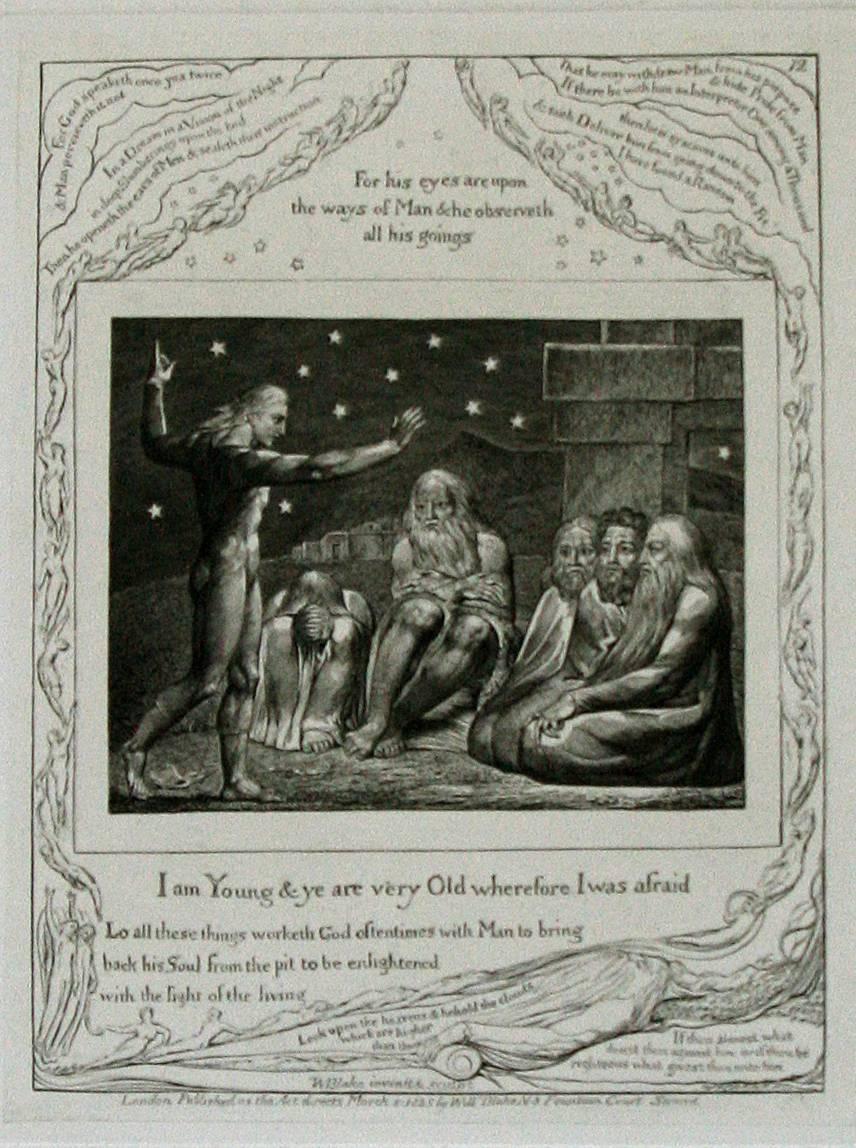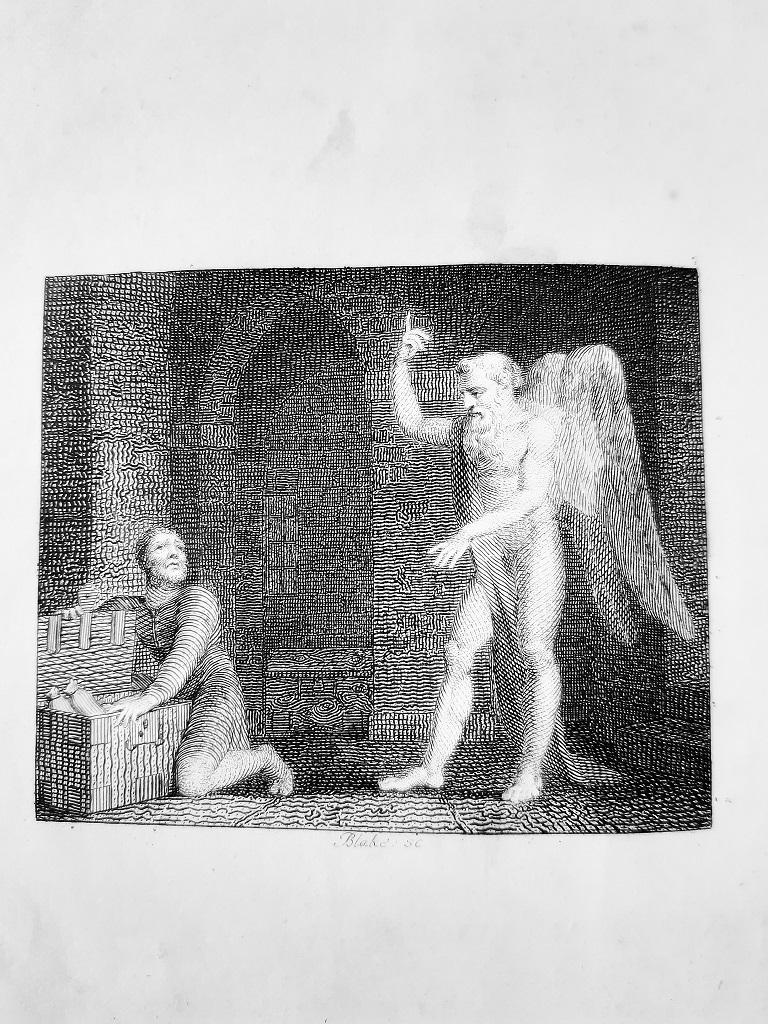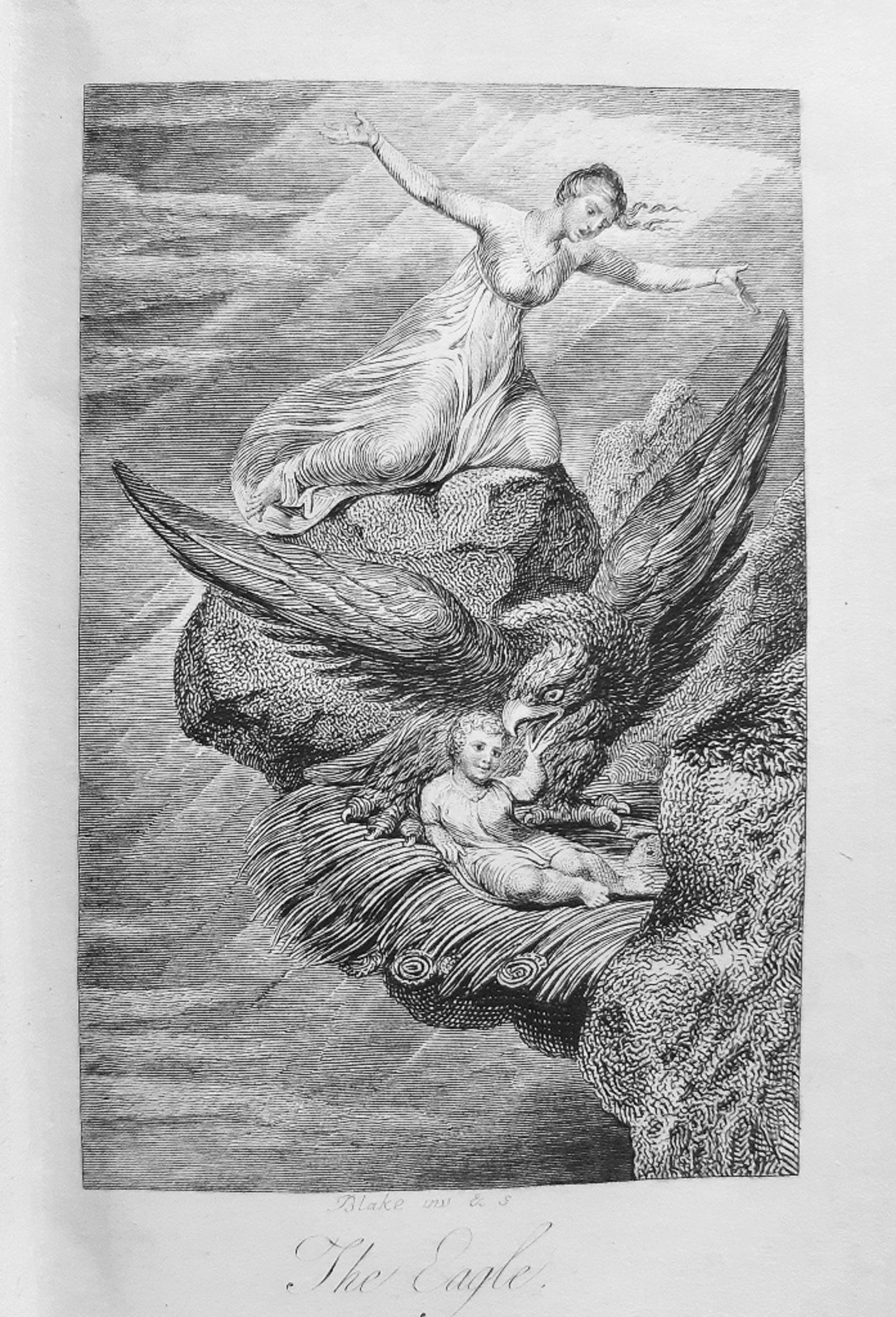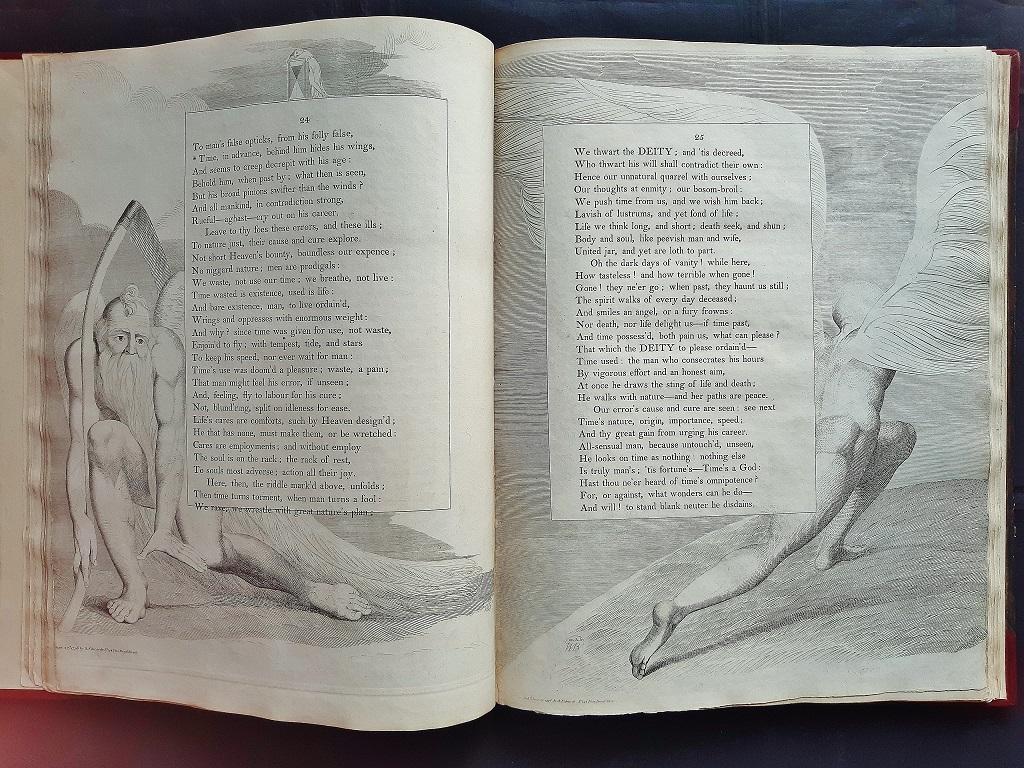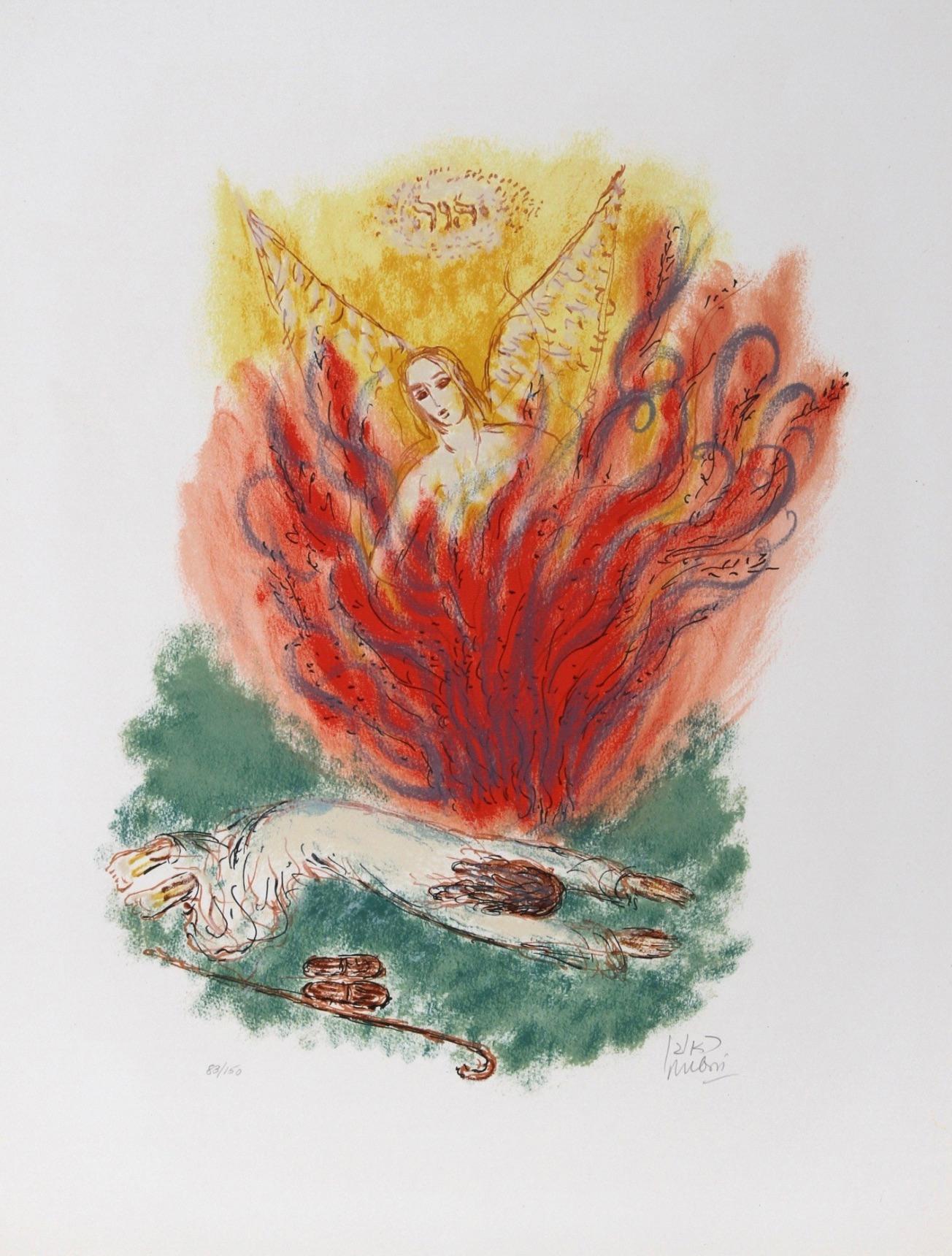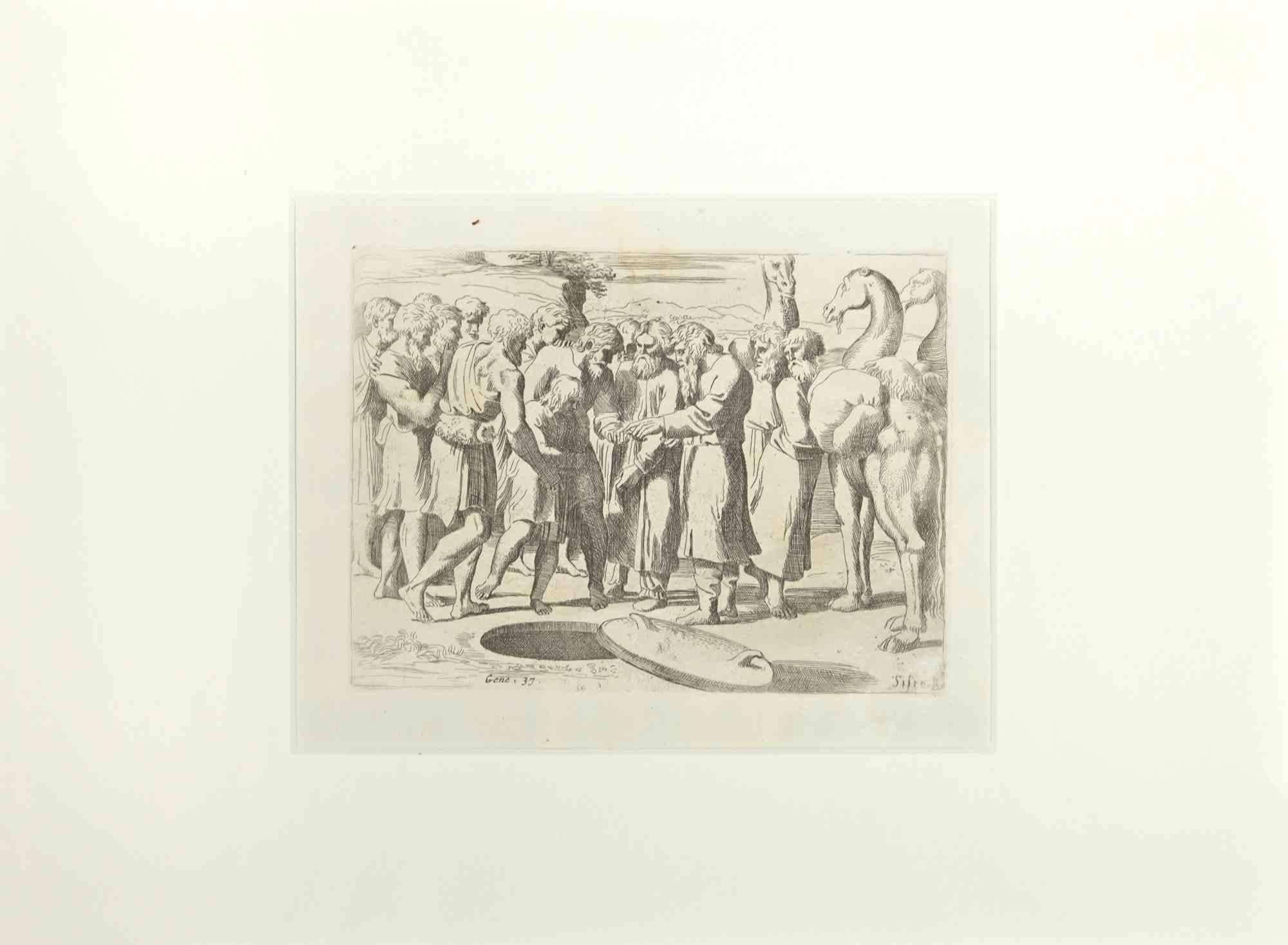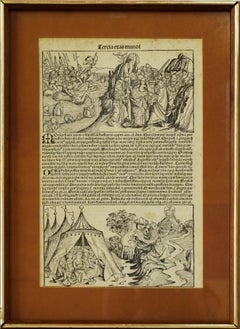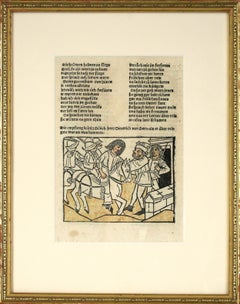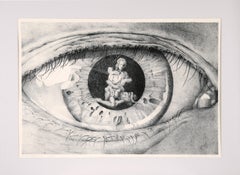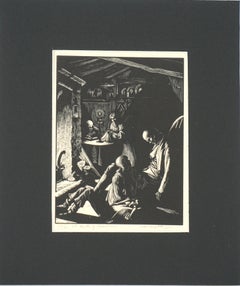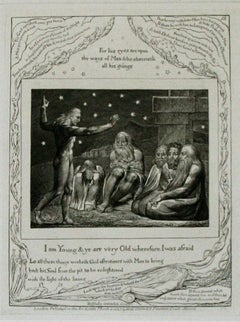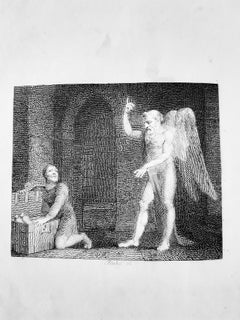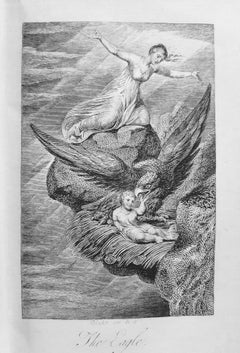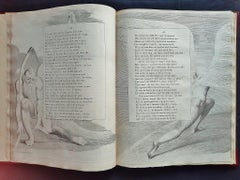Items Similar to Illustrations From The Book of Job - "The Fire of God is Fallen From Heaven"
Want more images or videos?
Request additional images or videos from the seller
1 of 9
William BlakeIllustrations From The Book of Job - "The Fire of God is Fallen From Heaven"1874
1874
$3,720
$4,65020% Off
£2,844.38
£3,555.4720% Off
€3,258.26
€4,072.8220% Off
CA$5,246.71
CA$6,558.3820% Off
A$5,710.43
A$7,138.0320% Off
CHF 3,051.45
CHF 3,814.3120% Off
MX$68,960.18
MX$86,200.2320% Off
NOK 38,349.24
NOK 47,936.5520% Off
SEK 35,669.26
SEK 44,586.5720% Off
DKK 24,340.70
DKK 30,425.8720% Off
About the Item
"Illustrations of the Book of Job" Engraving "The Fire of God is Fallen From Heaven...And the Lord said unto Satan Behold All that he hath is in thy Power"
Engraving, third printing 1874 (Binyon 108 iii; plate 3) on wove paper from "Illustrations of the Book of Job".
Engraved signature in lower design - W. Blake Inv & Sculpt.
Publishing line “London Published as the Act Directs March 8., 1825 by Will. Blake No. 3 Fountain Court Strand." Platemark 8 1/2" x 6 3/4", sheet size 10 5/8" x 8 7/8"
Condition: Very bright well printed sheet, In very good condition housed in a 20 x 16-inch archival mat
Unframed.
Sir William Blake (London, 1757 - London, 1827). Blake's early ambitions lay not with poetry but with painting and at the age of 14, after attending drawing school, he was apprenticed to James Basire, engraver. After his seven-year term was complete, Blake studied at the Royal Academy, but he is known to have questioned the aesthetic doctrines of its president, Sir Joshua Reynolds, and his stay there was brief. It nonetheless afforded him friendships with John Flaxman and Henry Fuseli, academics whose work may have influenced him. In 1784, he set up a print shop, but within a few years the business floundered and for the rest of his life Blake eked out a living as an engraver and illustrator. His wife, Catharine, whom he married in 1782, remained faithful and diligent and she helped him to print the illuminated poetry for which he is remembered today. In 1789, he published his Songs of Innocence, the gentlest of his lyrics, but the collection was followed by Songs of Experience, containing a profound expression of adult corruption and repression. His long list of works shows relentless energy and drive. As one of the most complex writers known, it is impossible to summarize his career - he was a combination of extremes. His vision of civilization as inevitably chaotic and contradictory mirrors the political turmoil of his era. It is only in retrospect that we can begin to appreciate his work and unravel its complex and allusive sources.
- Creator:William Blake (1757, British)
- Creation Year:1874
- Dimensions:Height: 20 in (50.8 cm)Width: 15 in (38.1 cm)Depth: 0.2 in (5.08 mm)
- Medium:
- Movement & Style:
- Period:
- Condition:Very bright well printed sheet, In very good condition housed in a 20 x 16-inch archival mat.
- Gallery Location:Soquel, CA
- Reference Number:Seller: D97021stDibs: LU54215588172
About the Seller
5.0
Platinum Seller
Premium sellers with a 4.7+ rating and 24-hour response times
Established in 1986
1stDibs seller since 2014
3,051 sales on 1stDibs
Typical response time: <1 hour
- ShippingRetrieving quote...Shipping from: Soquel, CA
- Return Policy
More From This Seller
View AllMoses Parts the Red Sea & Receives the Ten Commandments
Located in Soquel, CA
Moses Parts the Red Sea & Receives the Ten Commandments - Leaflet from the 1497 'Pirate' Nuremberg Chronicles
The Nuremberg Chronicles were first published in 1493 by Anton Koberg...
Category
15th Century and Earlier Figurative Prints
Materials
Rag Paper, Etching
Wolfdietrich - Original leaflet from Johann Prüss' Das Heldenbuch
Located in Soquel, CA
Original leaflet from Johann Prüss' 1479 printing of "Das Heldenbuch."
The Heldenbücher is the title given to a group of late medieval/early renaissance Germanic manuscripts primari...
Category
15th Century and Earlier Medieval Figurative Prints
Materials
Paint, Laid Paper, Woodcut
"A Midsummer Night's Dream" - Surreal Lithograph in Ink on Paper (#1/9)
Located in Soquel, CA
Detailed and vivid close-up of an eye with a reflection by an unknown artist (American, 20th Century). In the reflection of the eye, there is a person seated on the ground with a lar...
Category
1990s Surrealist Figurative Prints
Materials
Paper, Ink
Early 20th Century Wuthering Heights Genre Woodcut -- Death of Earnshaw #28/30
By Clare Leighton
Located in Soquel, CA
Wonderful genre woodcut of a scene from Emily Bronte's "Wuthering Heights" titled "Death of Earnshaw" by Clare Leighton (British/American, 1898 - 198...
Category
1950s Other Art Style Figurative Prints
Materials
Paper, Ink, Woodcut
God and the Four Evangelists ("Fool's Concert") - 1943 Linocut on Paper
By Leopoldo Méndez
Located in Soquel, CA
God and the Four Evangelists ("Fool's Concert") - 1943 Linocut on Paper
Leopoldo Méndez (Mexico City, Mexico, 1902–1969) "Fool's Concert" (from the portfolio "25 Prints of Leopoldo ...
Category
1940s Symbolist Figurative Prints
Materials
Linocut, Printer's Ink, Laid Paper
1940s Symbolist Figurative -- Her Holy Visions
By Marguerite Blasingame
Located in Soquel, CA
Symbolic figurative of woman having visions with religious themes and icons (cross, bride, salamander, crown, meeting Christ) while reading by Marguerite Louis Blasingame (American; 1906-1947), circa 1940-45. Marguerite and her husband Frank Blasingame...
Category
1940s Futurist Figurative Paintings
Materials
Canvas, Oil
$4,000 Sale Price
20% Off
You May Also Like
The Wrath of Elihu: 'I Am Young, And Ye Are Very Old, Wherefore I Was Afraid.'
By William Blake
Located in Storrs, CT
The Wrath of Elihu. 'I Am Young, And Ye Are Very Old, Wherefore I Was Afraid'. 1823-25. Engraving. .Binyon catalog 117 state ii, Bindman catalog 632. Image 7 7/8 x 5 15/16; plate 8 ...
Category
Early 19th Century Romantic Figurative Prints
Materials
Engraving
Fables - Vintage Rare Book Illustrated by William Blake - 1793
By William Blake
Located in Roma, IT
Fables is an original Modern Rare book engraved by Sir William Blake (London, 1757 - London, 1827) and written by John Gay (Barnstaple, 1685 – London, 1732) in 1793.
Full title: "Fa...
Category
1790s More Art
Materials
Paper, Etching
Ballads - Rare Book Illustrated by William Blake - 1805
By William Blake
Located in Roma, IT
Ballads is an original modern rare book written by William Hayley (Chichester 1745 - Felpham, Sussex, 1820) and illustrated by Sir William Blake (London, 1757 - London, 1827) in 1805...
Category
Early 1800s More Art
Materials
Paper, Etching
Night Thoughts - Rare Book Illustrated by Sir William Blake - 1797
By William Blake
Located in Roma, IT
Night Thoughts is an original Modern Rare book written by Edward Young (1683 – 1765) and engraved by Sir William Blake (London, 1757 - London, 1827) in 1797.
It includes a suite of ...
Category
1790s Modern More Art
Materials
Paper, Etching
VI from Visions of the Bible
By Reuven Rubin
Located in New York, NY
Signed and numbered in pencil.
Category
1970s Prints and Multiples
Materials
Lithograph
$2,400 Sale Price
20% Off
Genesis 37 - Old Testament Story - Etching by Sisto Badalocchio - 1607
Located in Roma, IT
Genesis 37 - Old Testament Story is an Etching print realized by the artist Sisto Badalocchio.
About The Old Testament Story, 1607 ca.
Passpartout ...
Category
Early 1600s Old Masters Figurative Prints
Materials
Etching
